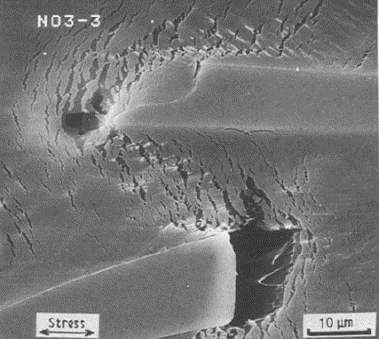Title of the thesis:
Investigation of residual stiffness and strength of short glass fiber reinforced thermoplastics after dynamic cyclic pre-damage
Abstract:
Short fiber reinforced thermoplastics (SFRT) are commonly processed using injection molding due to its economic, high-quality, and automated production of components. However, the flow conditions within the melt result in a layer structure with varying fiber orientations across the wall thickness. These local anisotropies pose challenges for experimental investigations of material fatigue under cyclic loading, as fiber alignment significantly influences the damage mechanisms. To address this issue, a injection molding process has been developed at the IKV, which enables the production of specimens with homogeneously high fiber orientation. Through a thesis at the IKV, you have the opportunity to acquire in-depth knowledge and experimental skills while making a significant contribution to the research of material fatigue.
Relevance to the research project:
The fatigue mechanisms in short fiber reinforced plastics are not yet fully understood. Consequently, components fail prematurely, are replaced early, or need to be oversized with high material consumption to ensure operational durability. As part of the research group, you will contribute to the investigation of material fatigue and support the IKV in developing methods for safe and sustainable dimensioning.
Objective:
The aim of your thesis is to conduct dynamic cyclic tests on SFRT to induce pre-damage. The resulting microscopic damage will be made visually observable through suitable techniques and examined. In the evaluation phase, you will systematically analyze the correlation between this damage and the macroscopically evaluated residual strength and stiffness. Your methodology and the acquired insights will be scientifically documented in a bachelor's or master's thesis.
For a bachelor's thesis, you will work on the following tasks:
- Familiarization with dynamic cyclic testing through a literature review of the state of the art
- Development of an experimental plan
- Conducting dynamic cyclic tests to induce pre-damage in the material
- Performing micro-computed tomography (micro-CT) examinations to determine micro-damage
- Conducting quasi-static tensile tests to determine residual stiffness and strength
- Analysis of influences on the observed damage patterns
For a master's thesis, you will work on the following tasks:
- Familiarization with dynamic cyclic testing through a literature review of the state of the art
- Development of an experimental plan
- Conducting dynamic cyclic tests to induce pre-damage in the material
- Performing micro-computed tomography (micro-CT) examinations to determine micro-damage
- Conducting quasi-static tensile tests to determine residual stiffness and strength
- Investigating and describing the relationship between dynamic pre-damage and residual strength/stiffness
Profile:
- Natural or engineering sciences background
- Independent and quality-conscious work approach
- Interest in experimental work and scientific data analysis
- Ideally, some experience in processing plastics
If this advertisement has sparked your interest, please contact me via email or phone and submit your application documents.
Contact person:
Roman Schmohl, M.Sc.
Phone: +49 241 80-28357
Email: roman.schmohl@ikv.rwth-aachen.de

